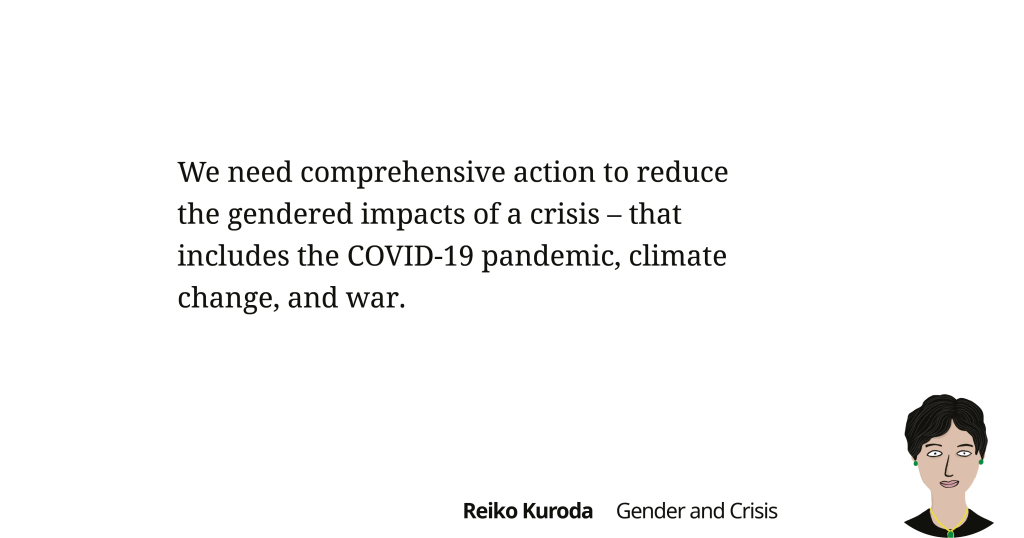Gender and Crisis

Covid-19, Russia’s war in Ukraine, the deprivation of human rights in Afghanistan, Iran and elsewhere—all these crises lead to severe cuts in people’s resources and degrees of freedom, diseases, mental and physical stress, poverty in all its forms, suffering from fuel and energy shortages, hunger, and violence. No crisis is gender-neutral; all affect women differently than men—and often in stronger and more lasting ways. In addition, we live in an era of profound transformation: climate change, digitization, demography, nationalism, globalization. These movements change the lives of us all, though their impacts depend on region, government, and economy and can differ by age, education, income, status, and gender. Here, too, it is women who suffer particular hardship, albeit with differences between them. An intersectional lens is indispensable to addressing these changes.
The GEAC 2022 focuses on three crises—the Covid-19 pandemic, climate change, and Russia’s invasion of Ukraine—and details three areas of pervasive gendering: the consequences of crises, the measures used to combat crises, and the decision-making bodies that steer crisis management and provide the top personnel in the emerging sectors of the economy.
Consequences. Crises usually push women back to the family, and traditional role models flourish. The gender care gap widens, as do the gender income and pension gaps—increasing the financial vulnerability of women. Caring for others inside and outside one’s own family leads to high psychological stress, and women struggle to live up to cultural expectations and their own internalized values. Moreover, the withdrawal into the private sphere leads to more violence within the family, with women overwhelmingly the victims. The Russian war in Ukraine forces migration of mothers with their children and the loss of their homeland. Worse, war leads to trafficking, rape, and femicide. In sum, the mounting crises wreaking havoc across the world intensify women’s poverty and economic insecurity, displacement, violence against women, and discrimination.
Measures used to overcome crises often favor men. Male-dominated occupations and sectors receive more public aid than female-dominated jobs. Energy-saving measures are based on the needs of men, while women have different needs for energy consumption. Curfews burden women more than men, since they are more dependent on social communities and infrastructure for their children and parents.
Decisions made in crises are usually made by men or male-dominated bodies, who often lack perspective on the social consequences of their actions: family, schools, and care facilities are not always part of their lived experience. In the new prosperous labor markets, characterized by digitization and the ecological restructuring of our economy, men are overrepresented by far. The knowledge and talents of women remain unused.
Our Experts

Prof. Dr. h.c. Jutta Allmendinger, PhD is the chair of this year’s GEAC under the German G7 presidency. She was previously a member of the UK’s 2021 GEAC. Dr. Allmendinger is President of the WZB Berlin Social Science Center and Professor at Humboldt University Berlin. She is the recipient of numerous awards, including the Federal Cross of Merit, First Class, the Communicator Prize and the Schader Prize. She is active on numerous advisory boards in Germany and abroad, such as the supervisory board of Berlin’s BSR Department of Sanitation and the editorial board of the weekly DIE ZEIT. In 2021, she was appointed by Pope Francis to the Pontificial Academy of Social Sciences.

Isabelle Hudon (Canada) is the President and CEO of BDC, the bank for Canadian entrepreneurs. Ms. Hudon brings a deep business background and a clear vision for an inclusive economy to support growth for Canadian entrepreneurs. She is a champion of diversity, gender equality, and the green economy, leading BDC’s 2,500-person team. From 2017 to 2021, Ms. Hudon was Ambassador of Canada to France and Monaco.

Reiko Kuroda (Japan) is a Professor Emeritus of Chemistry and Biology at Chubu University and the University of Tokyo in Chemistry and Biology. She has served as the Vice President to the International Science Council, scientific advisor to UN Secretary General Ban Ki-Moon, and Ambassador of the Women’s Initiative in Developing Stem Career (WINDS). Ms. Kuroda is an active member of the Royal Swedish Academy of Sciences and the Club of Rome.
Statements from our members
Features
-
 Videos
VideosGEAC Chair Jutta Allmendinger: Statement for the G7 Foreign Ministers
 More
More
-
 Updates
UpdatesMeeting of G7 Gender Equality Ministers
 More
More
-
 Updates
UpdatesContinuing GEAC in 2023
 More
More
-
 Updates
UpdatesG7 GEAC has started its work
 More
More
Show all RELATED Features


